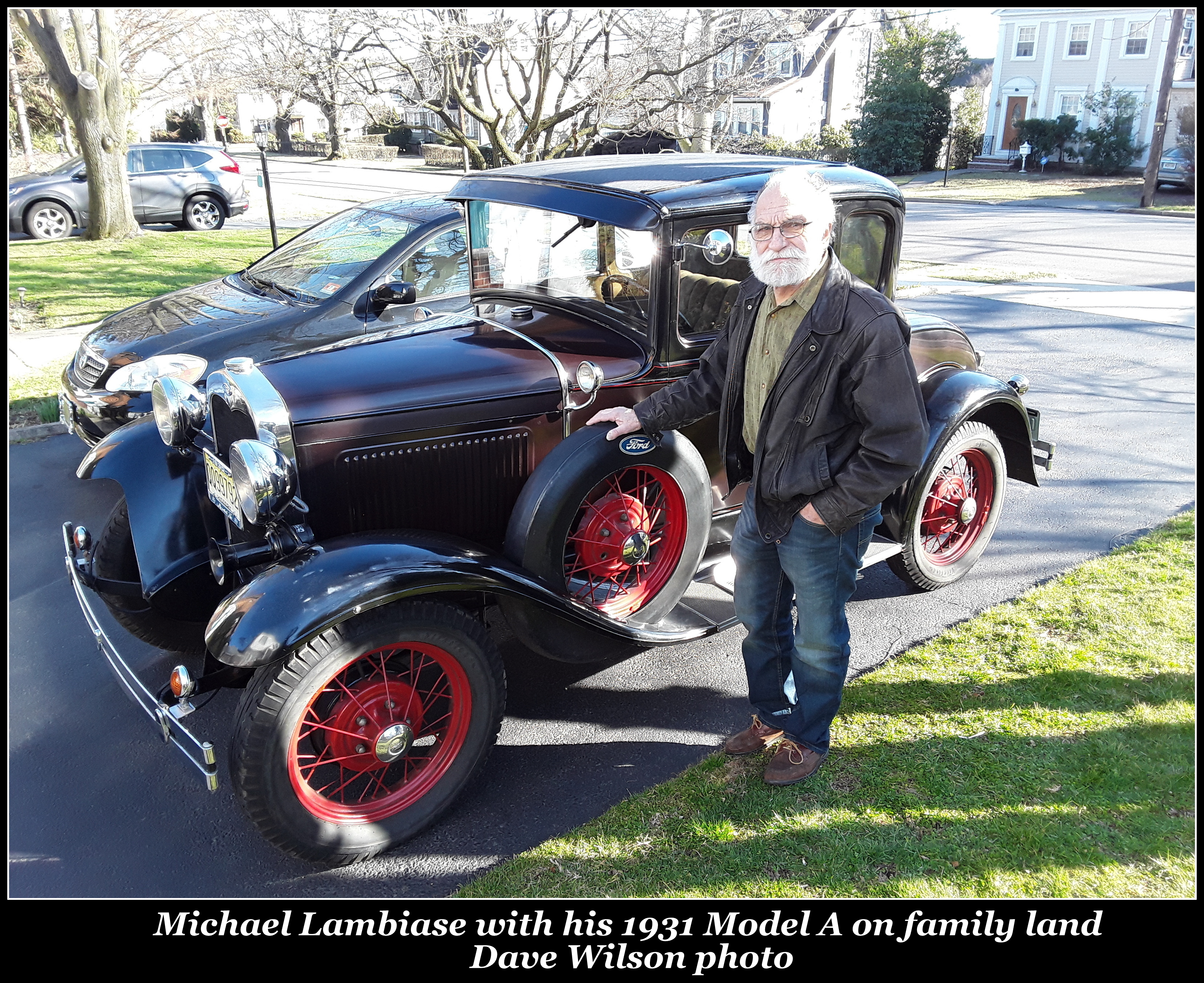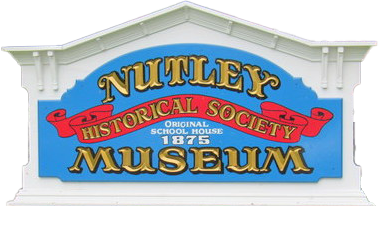By Michael Lambiase and David Wilson
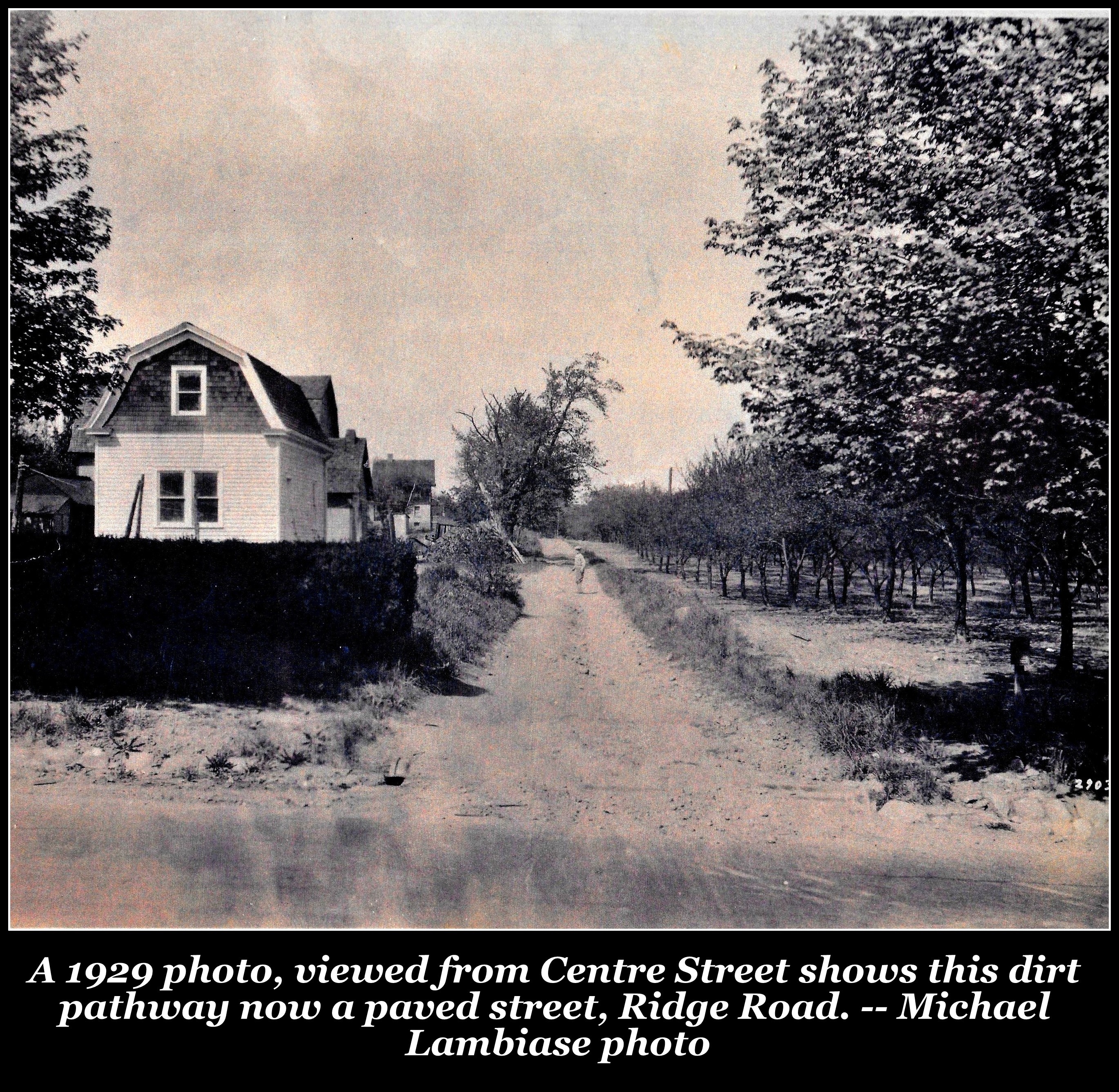
Now, there were many peach trees and some apple and pear and a persimmon tree, which if the fruit were picked untimely, would curl your lips inside out. There was a field of corn, some tomatoes, and other assorted veggies. A wooden, three-step, outdoor fruit and vegetable stand to sell produce alongside chicken eggs stood at the front of the house...
This is the story of the last farm in Nutley, six acres on the south-eastern side of Ridge Road, reaching to Bloomfield Avenue, 600 feet from Centre Street and to the water pipeline. The original farm house was removed to allow for Ridge Road expansion and replaced by the current house in 1933.
Three generations, Francisco and Maria with daughter Ann, son Anthony and Esther, with children Michael, Richard, Thomas, and Anna lived on the farm. All the action was in the basement where an eight-foot table was the centerpiece for meals and family business. There was a tiled kitchen and pantry on the first floor and a telephone in the sun parlor. Francisco Lambiase was a furrier-flesher of animal skins for fur coats and apparel.
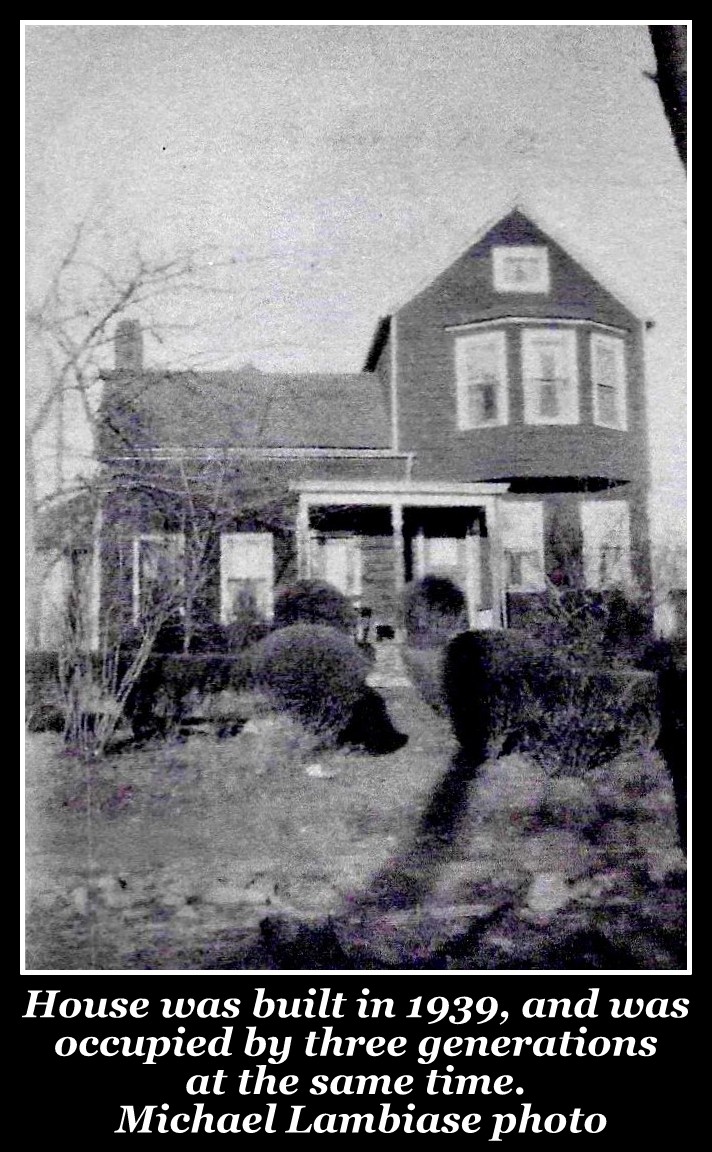
Structures included a two-story barn, chicken house, elevated turkey run, along with assorted sheds and outhouse. There were chickens, turkeys, ducks, peacocks, a goat, pigs, and a horse named Jimmy. Rats were part of the farm along with a copperhead snake residing near Povershon Road. Michael recalls Blair’s Nursery at the corner of Ridge Road and Centre Street had a horse named Sandy.
Now, there were many peach trees and some apple and pear and a persimmon tree, which if the fruit were picked untimely, would curl your lips inside out. There was a field of corn, some tomatoes, and other assorted veggies. A wooden, three-step, outdoor fruit and vegetable stand to sell produce alongside chicken eggs stood at the front of the house on Ridge Road. One neighbor from down the street wants a dozen eggs, but no brown ones.
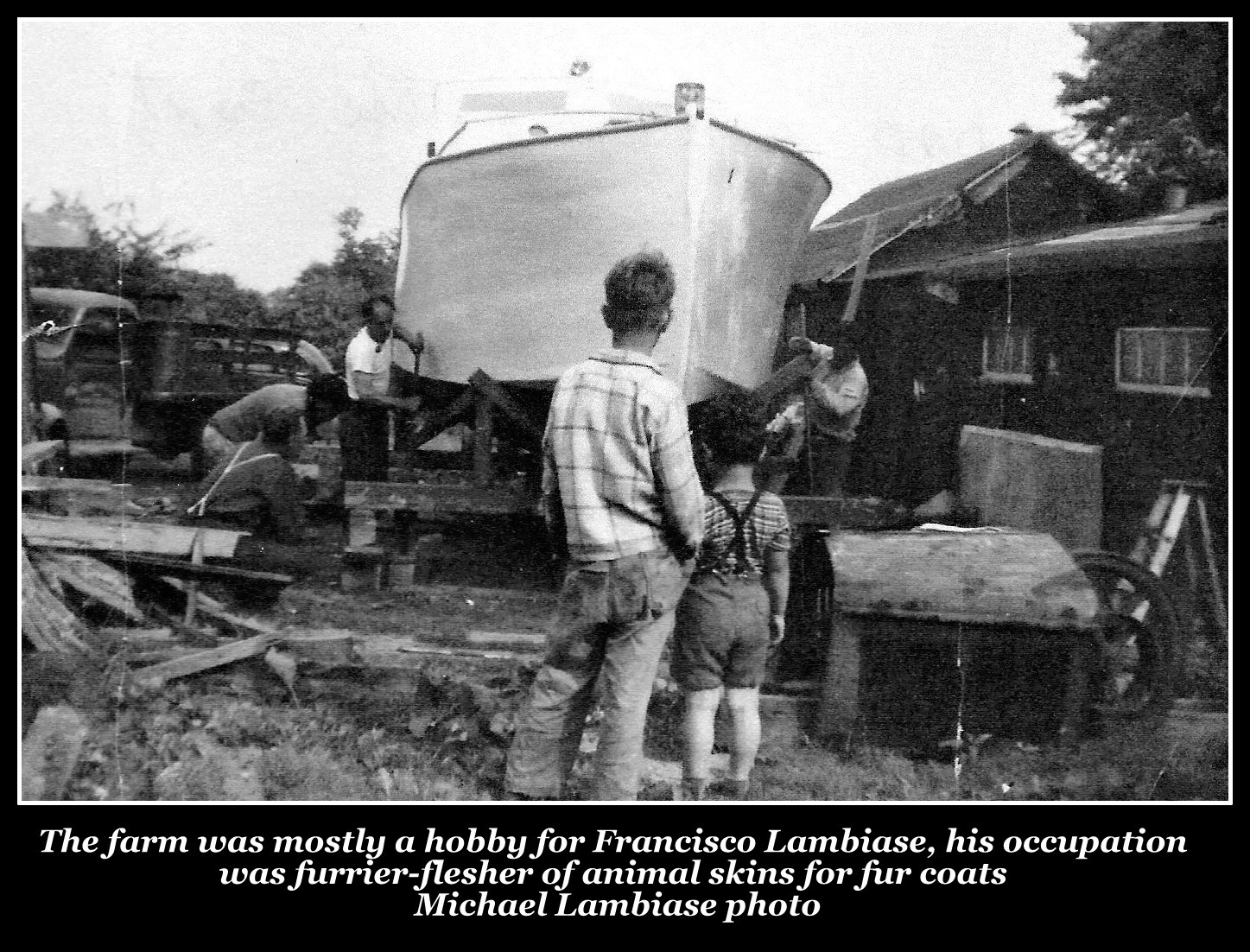
Michael's dad Dad built a 27-foot cabin cruiser in the yard to replace his first boat lost in the 1938 hurricane.
Of his grown-up days, working as a carpenter, Michael recalls meeting fellows, "understanding where I came from would tell me, they would steal my peaches, they were good peaches. As a child, picking and eating a tree ripened peach, as large as a softball, rubbing the fuzz from its skin and taking that first bite was farm living perks. The juice would run down my chin, dripping onto my shirt. Wow, just delicious. Don't pick a ripe peach after a rain. It will spoil and rot in about a day. Wait until the sun dries the moisture from the skin, then they will last."
On a warm afternoon at the age of 14, Michael was walking home from a friend's house crossing through a field of high grasses when he accidentally stepped on a sleeping skunk. "We were both surprised! That smell is totally different when you're wearing it on your person. Mom could smell me arriving home."
Working on a farm with animals is quite arduous. Just per se, the chickens: feeding and watering them, collecting the eggs and more. Mom hated that job. It takes over your life, but she did it anyway.
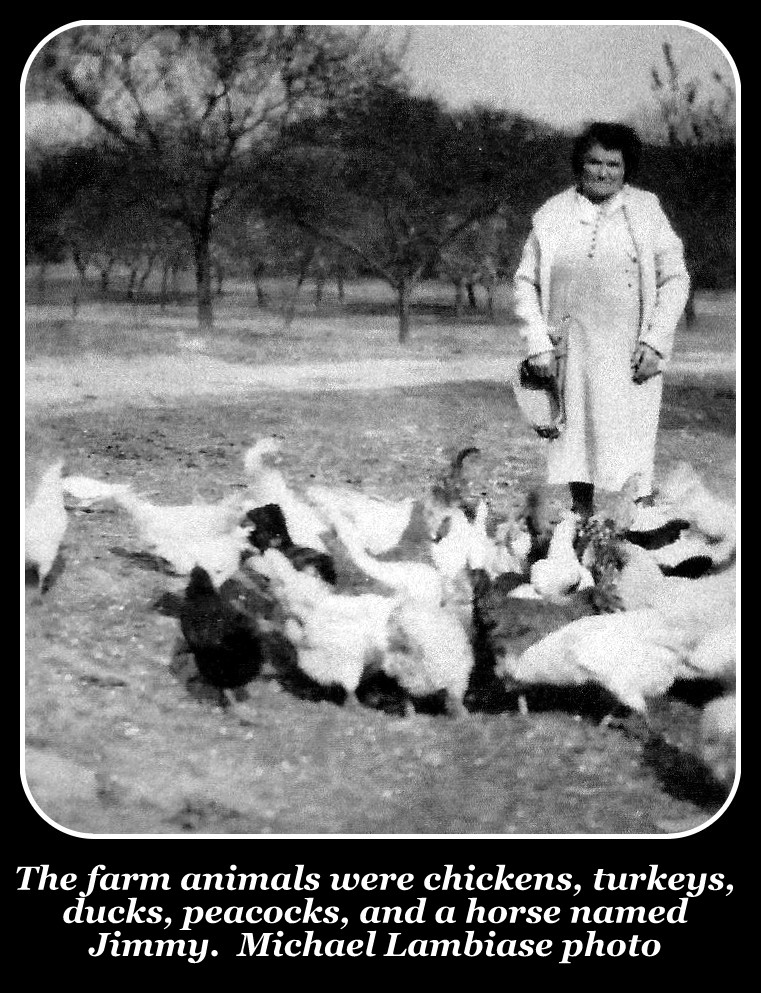
Back then the milk was only pasteurized. It came from Cerami's dairy on Franklin Avenue; that area is now the Town garage. Milk was delivered to homes by the milkman. At times, in the winter, the cream would freeze and the paper cap would pop part of the way off the milk bottle, as the cream part was lighter than the milk.
Michael recalls Mr. Cerami as short, Italian man, in the habit of smoking a De Nobili cigar. At times, Michaels's mom would call the dairy and tell Mr. Cerami, "the milk tasted like onions."
The answer was always the same: “Damn cow!” as you could hear him pounding the phone table with his hand, “Breaka da fence, go out and eata the wild onions!” So we drank onion milk for a few days, Michael remembers, "We didn't make much of a fuss."
All the action was in the basement of this operating farm. A large table for serving and eating meals was at its Center. There was a tiled kitchen with a pantry on the first floor, but almost everything happened in the basement. The telephone was upstairs on the first floor, in the room called the sun parlor. To answer it meant a trip up the stairs to the 3 or 4 party line also attached to our neighbor’s phones in those days. You could always pick up and listen to other people’s conversations, but it wasn’t proper.
One time, mom went to answer the phone. Upon returning to the basement she relayed the phone message to us from Monsignor DeLuca at Holy Family Church. He wanted a “chicken le u brod” mom explained, imitating his Italian accent to us in the cellar. My older cousin Sonny quipped “What? Monsignor DeLuca wants a chicken for some broad”? No, he wants a chicken for the broth, for chicken soup.
Center Street is not a far distance if you're going for a walk, but one night (well it was two in the morning), Dad said Joe Pane’s still blew up on Center Street and a piece of it landed in our yard.
There was always someone visiting and cousin Sis, a jovial person, brought a lump of taffy that needed to be stretched and worked. Most everyone was yanking and pulling on that stuff across the long table. It was like a large rubber band causing a lot of laughing. I've heard of a taffy pull, but I don't remember tasting any of the stuff that day.
A dirt driveway from Ridge Road curved down past the original garage that housed two cars and continued on, ending at the barn. There was an outhouse behind the barn my grandfather would use from time to time if he wanted no one to bother him and time to be alone.
Many other people would visit from Newark, mostly men friends from the old neighborhood coming to say hello. One man, with a strong German accent would bring five-year-old Michael a roll of candy Life Savers as a gift and say he had gotten them from neighborhood “drruug store.”
Michael remembers his grandfather's sense of humor. In the open air of the farm, there were four or five men together out at the barn, when one person expelled some gas. Grandfather asked this person in Italian, “Ti hai bruciato i calzoni” or did you burn your trousers?
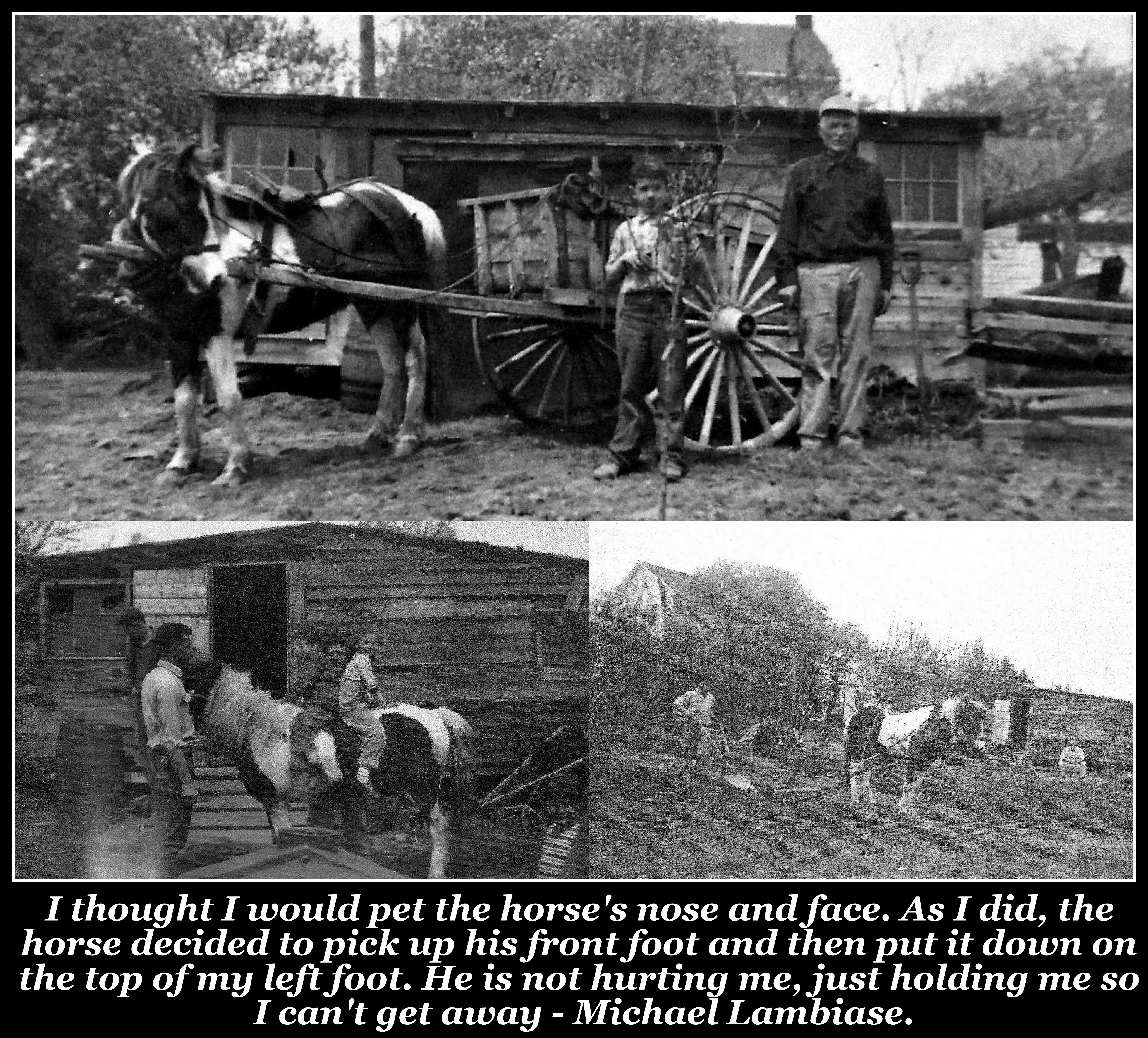
Michael recalls, "I was seven and the horse was tied outside to a fastener near the barn door. I thought I would pet his nose and face. As I did, the horse decided to pick up his front foot and then put it down on the top of my left foot. Animals have a certain intelligence all their own, that might amaze you. Now there I am, horse on my foot, but he is not hurting me, just holding me so I can't get away. I pounded on the horse’s leg that held my foot. I must have seemed like a mosquito tapping on an elephant. This may have gone on for five or six minutes until he picked up his foot to release mine.
In the photo of Michael and his dad on their 1928 Cleartrac tractor, the two-year-old was trying the tractor steering wheel as Dad held him. Other than a ride now and then, the tractor was used for plowing the fields in the spring.
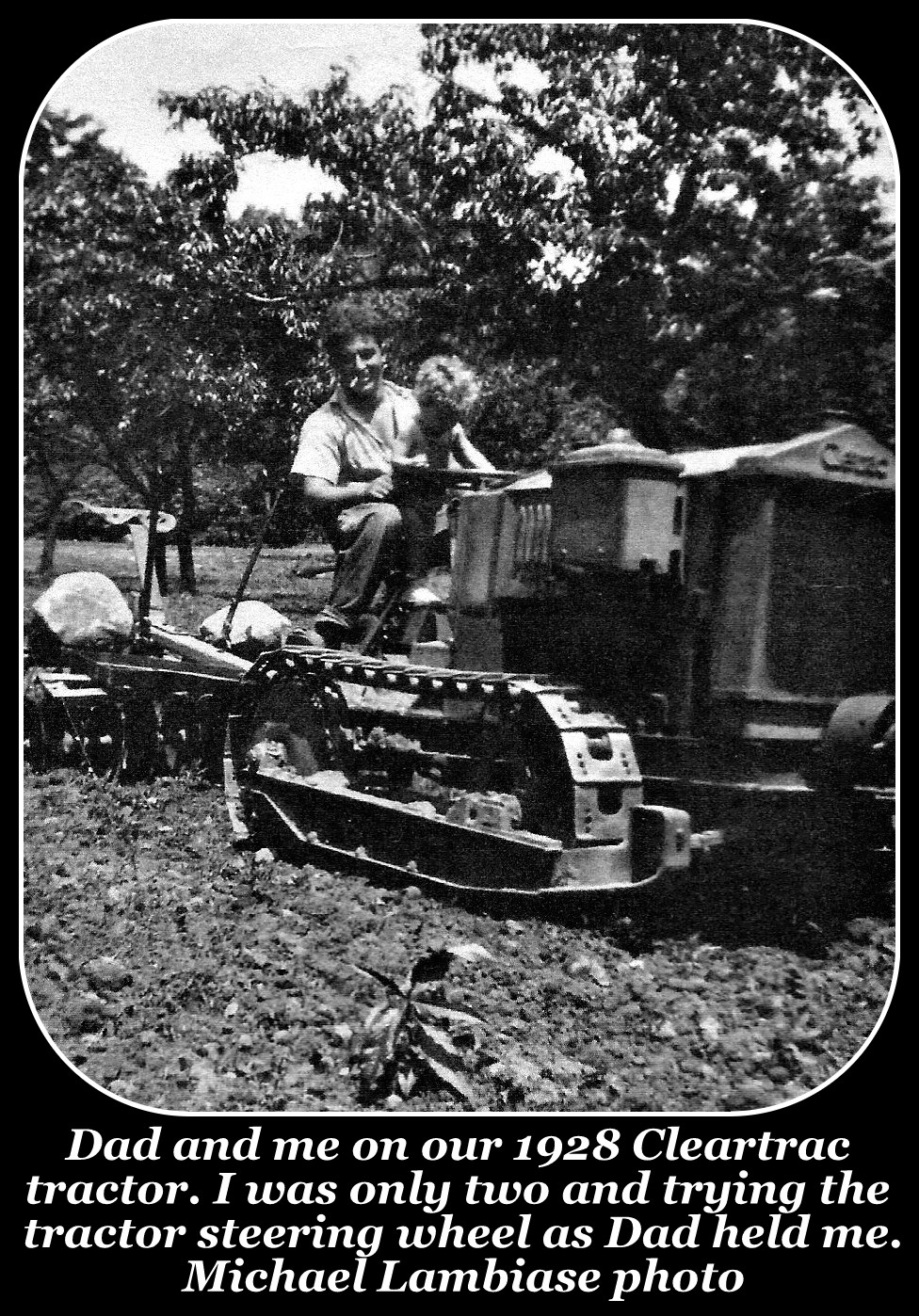
Other machinery was a single piston engine that ran a stationary circular saw blade apparatus with a long, heavy, leather drive belt for cutting firewood to fill the wood and coal burning stove in the basement. When that large circular saw blade got spinning and whooshing, it was scary and made a frightening sound, especially when the logs were pressed in to cut the firewood. "I'm glad Dad never got hurt working with that thing. The saw blade now hangs quietly, decorating our living room wall as a memento of past memories," Michael said.
Grandfather rented stable space to a man who had a clothes cleaning establishment and owned four or five horses. His name was Wally Del Hagen. He also had a horse-drawn carriage as this was his hobby relaxation. A horse has tremendous strength, power, energy, and vigor.
A friend took a horse out one day for a ride about town. The carriage broke loose half way up Chestnut Street. The hapless driver held onto the reigns and was dragged all the way to Ridge Road sustaining many cuts and abrasions. "Two or three women came from their homes and bandaged him the best they could," Michael recalled. "I think he was taken to the hospital. I do not know what happened after that."
Thinking back Michael recalls, "Across the street was an old barn and large field of weeds all the way up a steep hill, which is now Fisher Avenue. An old house was at the top. They had a beagle that announced evening as the sun set over the hill and his howling bark seemed to roll down the slope in my direction like some sort of audible tumbleweed as day was coming to an end."
"At the side of the house was a water well with an old fashioned hand pump, handle on one side, nozzle on the other. It was dark gray metal standing about three and a half feet high and provided the drinking water for the old house. As a young boy, I would think it was amazing and fun working the pump handle up and down and drinking water that came up out of the ground. That pump stayed until the land was sold and houses were being built there."
Francisco was a bird enthusiast and enjoyed the songs of his prize-winning canaries. A male turkey ran freely and was quite aggressive and territorial. Michael, at age five, teased the tom occasionally and would run to the back porch for safety. The crazy turkey chased a visiting school teacher and her class from the farm.
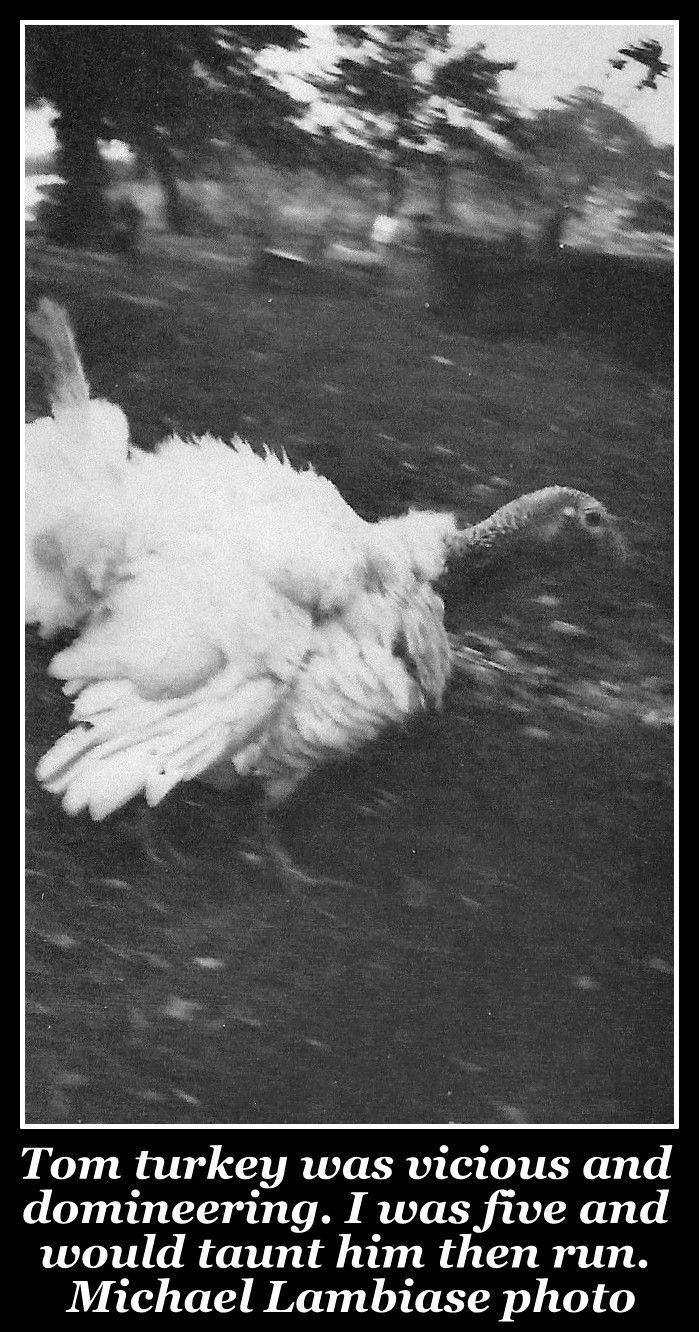
"I now think back," Michael muses, "as a young child, I may have been as ornery and an annoying tease as that turkey had been."
The peacocks served no real purpose other than their screeching calls during the night being heard by neighbors on Centre Street. The male peacock would spread his tail feathers up into the air from time to time with all its glistening blue and green colored feathered eyes to show off and perhaps enticed the peahens. As for the screeching sound, Michael says, "I really don't know how to describe it, just a high pitched noise that I didn't pay much attention to. It didn't disturb me or I just tuned it out. Something on the order of, the farmer doesn't really smell manure."
Dad told me about the man who sold the farm to grandfather who stayed in the barn for about six months to teach and show him the workings of the Farm.
The farm was sold due to rising property taxes. Developers built twenty-six houses on the fields. As a training exercise, the Nutley Fire Department was called in to remove the barn by setting it on fire and keeping the flames under control and the area safe.
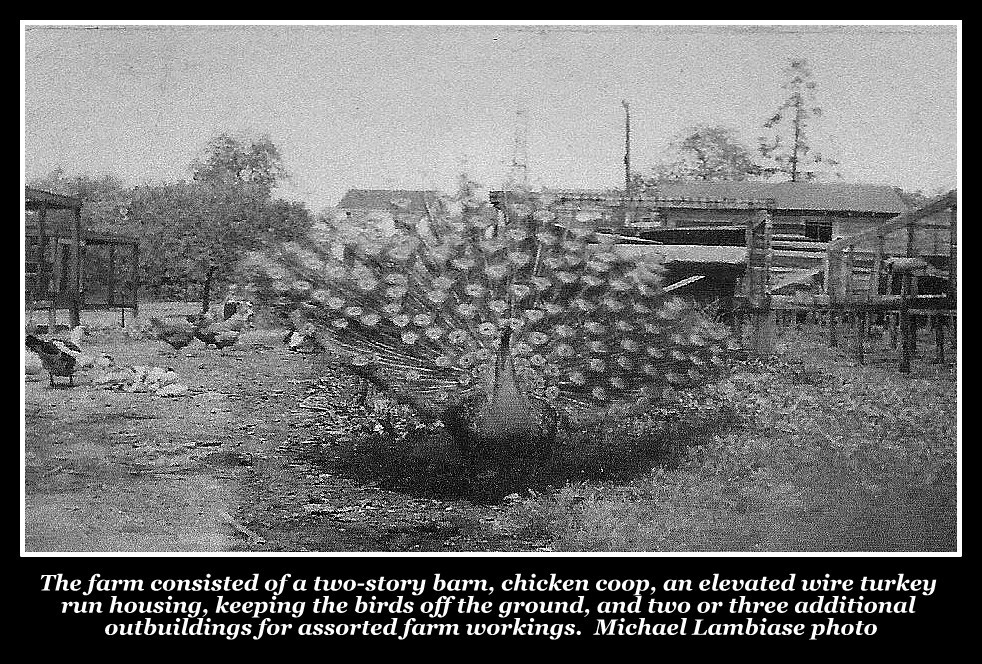
Michael recalls, "In 1954, I stood off watching the bulldozer plow down the peach trees which my grandfather had so carefully and lovingly planted. Grandfather also watched, standing several feet ahead of me. I could see he had tears in his eyes. A few pieces of property were saved for future family keepsakes. I built our house and home on one and here we are to this day."
By Michael Lambiase and David A. Wilson
Farm photos courtesy Michael Lambiase
Adapted from Nutley Neighbors, August 2020; Best Version Media
A community magazine serving the residents of Nutley, N.J.
